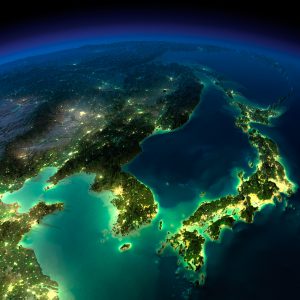Japan has praised South Korea’s announcement of a new plan to compensate victims of forced wartime labor during Japanese imperial occupation, after deadlock over the issue plunged bilateral ties to a postwar low.
An existing South Korean government-backed foundation will pay 15 victims through donations from the private sector – as opposed to the two Japanese businesses that were ordered to pay up by the South Korean Supreme Court in 2018 for their links to forced labor.
In turn, Tokyo says it will allow Japanese firms accused of using South Korean forced labor to voluntarily make donations to the fund and allow the companies to make an apology in line with the government’s existing policy on the matter.
Prime Minister Kishida Fumio has adopted the previous administration’s rhetoric that the compensation issue was resolved in the 1965 Treaty of Basic Relations between Japan and South Korea. The treaty included $500 million in loans and grants to South Korea in the name of “economic cooperation.” The Kishida administration has been reluctant to agree to a new arrangement that requires Japanese companies to pay compensation, as the South Korean Supreme Court ruling demanded.
Alongside Seoul’s plan for handling the compensation, Japan and South Korea have resumed talks on removing Japan’s restrictions on semiconductor exports to South Korea by putting the country back on a preferential “white list” of countries entitled to simplified export procedures. Japan has maintained this move, made in 2019, was not in reaction to the South Korean Supreme Court decision and is a “separate matter.”
Meanwhile, Japan’s biggest business lobby, the Japan Business Federation also known as Keidanren, will also launch a “future youth fund” offering scholarships to South Koreans studying abroad in Japan.
The unresolved labor dispute is one of the biggest barriers to addressing growing regional threats. In 2018, the South Korean Supreme Court ordered Nippon Steel Corporation and Mitsubishi Heavy Industries to pay compensation to forced labor victims during Japan’s imperial annexation of Korea between 1910 to 1945. When the companies refused to abide by the ruling, the Supreme Court seized and ordered the sale of both companies’ assets in order to compensate victims.
The Japanese government rejected the ruling and shortly after introduced export restrictions on semiconductor related materials. South Koreans began boycotting Japanese products in 2019 in retaliation and the South Korean government issued a protest with the World Trade Organization (WTO).
Now South Korea says it will halt its WTO dispute settlement claim challenging Japan’s export controls. South Korea has taken a leap of faith and it expects Japan to respond with sincerity.
South Korea President Yoon Suk-yeol has been eager to repair bilateral relations since taking office last May. Last week, on a national holiday marking South Korea’s independence from Japanese imperial rule, Yoon emphasized how Japan has transformed from aggressor to a “partner that shares the same universal values with us.”
South Korea’s Foreign Minister Park Jin said in a press briefing that the “soured South Korea-Japan relations should no longer be neglected, and we need to end the vicious cycle for the national interest, for the people.”
However, the South Korean government is facing backlash from opposition parties for absolving Japan of the financial responsibility to compensate forced labor victims. There is widespread public opinion in South Korea that Japan has yet to pay its dues for its imperial aggression.
The Japanese government’s response to Yoon’s independence day speech was largely subdued and guarded. A senior official from Japan’s Ministry of Foreign Affairs stated, “Japan will do what it can once South Korea makes a formal decision on a solution.” Kishida has repeatedly used the 1965 treaty phrase “heartfelt reflection and sincere apology” in talking about Japan’s imperial aggression. But he has stopped short of taking concrete steps toward a resolution.
With its new plan, the Yoon administration is calling for a “good faith” response from the Japanese side to contribute to the closure of the historical wartime labor issue.
Both governments hope the normalization of Japan-South Korea relations will pave the way for proactive discussions for other pending bilateral diplomatic disputes, such as the contested Dokdo/Takeshima Islands, which are controlled by South Korea but claimed by Japan, and Japan’s use of military sex slaves (also known as “comfort women”) in occupied territories during World War II.
Last week, Japan’s former Prime Minister Suga Yoshihide was appointed head of an intraparty group of lawmakers promoting friendly ties between Japan and South Korea. Some experts point out that a former prime minister serving as chief of the parliamentary group indicates Japan’s effort to take the dispute more seriously.
U.S. President Joe Biden has hailed the South Korean move to close the disagreement as a “ground breaking new chapter on cooperation and partnership between two of the United States closest allies.” Japan has also been asked to extend an invitation for South Korea to attend the G-7 Summit in Hiroshima in May as an observer to symbolize regional unity.

































